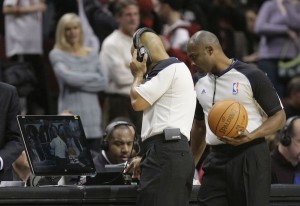NBA referees right to call foul on Last Two Minute reports
They are the most powerful individuals on the court. Theirs is the final word. Whatever they say goes; if they say it’s you, then you have to go.
No one loves them aside from their family. Even that can vary based on which calls are made and which team Uncle John and Aunt Jane bet on.
If game officials are a tad defensive when the public slams their work, that’s understandable.
But I don’t think the National Basketball Referees Association is being thin-skinned in calling for an end to the NBA’s Last Two Minute Reports. The organization made several valid points in a news release Tuesday.
The “transparency” the league seeks in releasing officiating critiques “does nothing to change the outcome of the game” and “encourages anger and hostility toward NBA officials,” the NBRA said. “… While the goal of transparency was to promote understanding and credibility, there is no evidence that progress against these goals is being made.”
Indeed.
The league insists that L2M reports are a good thing, but no one can explain how. In the annual pre-NBA Finals news conference last week, commissioner Adam Silver said the public wants to see consistency and “understand if we call something a foul, why we called it a foul, and we often give explanations for why we believe something was a foul, whether it was correctly called or incorrectly called.”
Silver hopes the reports and use of instant replay are “building trust and integrity in the league. People are going to recognize that we are going to make mistakes, the officials are going to make mistakes,” he said last week. “Human error is going to be part of this game, just as it is with the players. … I’d say largely what these Last Two Minute Reports are showing is that the referees get it right about 90 percent of the time.”
Except the other 10 percent is what everyone harps on, always to no avail and often with no clear answer.
Consider one of the most difficult calls in sports, the block/charge foul. If you put 10 officials in a room around a replay monitor – or on the floor in real time – five might see an offensive foul while the other half sees a blocking foul. Judging judgment calls is a slippery slope that extends with each group that weighs in.
From the three-man crew, to replay officials, to officials on network payrolls, to game announcers, to print and broadcast media and to unaffiliated basketball fans, consensus is unattainable. Perhaps the only thing more inconceivable is officials being right 100 percent of the time.
But L2M reports require a call on late-game calls. So the reports pick sides. The refs were deemed correct in determining that Dwayne Wade wasn’t fouled in Game 5 of the Miami-Charlotte series, but they were deemed incorrect in not calling a foul on James Harden in Game 3 of the Houston-Golden State series.
Regardless of the L2M rulings, the NBRA has some legitimate questions. Who makes the evaluations and what are the evaluators’ qualifications? Who has the power to edit and change the evaluations? Are the guidelines and instructions for game officials also followed by evaluators?
The referees want to do away with the reports altogether and I wholeheartedly agree with that sentiment. But if the league insists on continuing the policy, the refs recommend even more transparency. I agree with that, too.
They want the NBA to identity the individuals responsible for L2M reports and ensure that those individuals have extensive on-court experience. The association wants the rules interpreted consistently, claiming “it’s not uncommon to see L2M review comments contradict directions/guidelines given to the game officials.”
The third recommendation is the establishment of an appeal process. “L2M reports represent only a single perspective on a particular play, and those judgments are not infallible,” the NBRA said. “A forum to question/challenge an L2M report decision will encourage dialogue that will enhance fan understanding and ensure that everyone involved benefits from valuable learning and insight.”
Not necessarily. It’s feasible that the two sides might never agree on a particular play.
But since the league thinks public second-guessing is a great idea, the refs should have a forum to respond.
That way we can continue to discuss calls even longer after a game ends!
“We understand the referee union’s desire to protect its members,” NBA spokesman Mike Bass said in a statement responding to the NBRA release. “But the fact is that in today’s world, transparency is necessary for any organization. The NBA is no different and we are committed to protecting the integrity of our game.”
Too bad L2M reports don’t do a thing for the league’s integrity. Acknowledging blown calls doesn’t mean they were honest mistakes. Anyone who subscribes to “the fix being in” won’t be dissuaded just because the league tsk-tsked the referees.
In fact, L2M reports provide perfect cover.
That might be the only thing they’re actually good for.
 Follow
Follow

